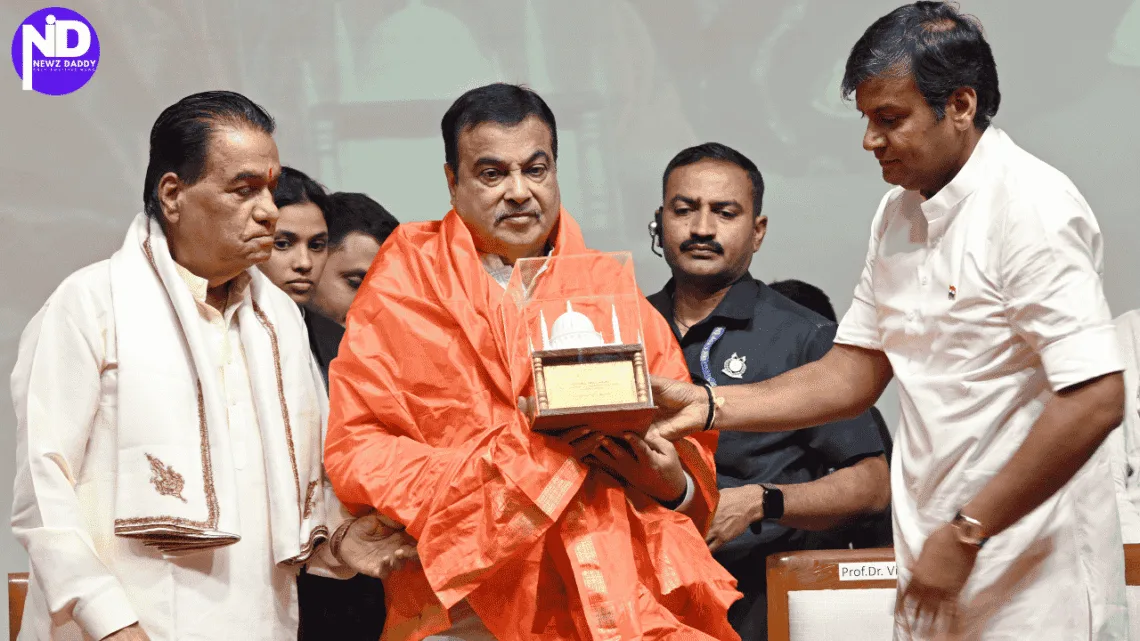MIT-WPU Leads India’s Journey in Sustainable Tunnelling
Newzdaddy Business Updates
We intend to construct tunnel projects totalling between ₹2.5 and ₹3 lakh crore during the next ten years: At the MIT-WPU International Workshop on Sustainable Tunnelling, Nitin Gadkari
• The First Centre of Excellence for Tunnelling and Underground Construction in India is established by MIT-WPU.
• The workshop emphasises the importance of industry-academia cooperation and India’s increasing demand for climate-resilient infrastructure.
• Advanced tunnelling techniques and technologies for difficult terrains like the Himalayas are discussed by experts from India, Europe, the UK, and the US.
The Hon’ble Union Minister for Road Transport and Highways, Mr. Nitin Gadkari, today opened the International Workshop on “Sustainable Tunnelling for Better Life” at MIT World Peace University (MIT-WPU) to promote the development of sustainable infrastructure. Global experts from India, Europe, the United Kingdom, and the United States have gathered for the two-day event, which was arranged in cooperation with the International Tunnelling and Underground Space Association’s Committee on Education and Training (ITA-CET).
The opening of MIT-WPU’s Centre of Excellence for Tunnelling and Underground Construction, India’s first-of-its-kind facility, including a Tunnel Monitoring Laboratory and a Drilling & Blasting Laboratory, was a major event highlight. Supporting cutting-edge research and training in underground construction technologies is the goal of the Centre of Excellence, which was established in partnership with Sandvik and Tata Projects Ltd.
Renowned professionals from the area, including Mr. Arnold Dix (Past President, International Tunnelling Association), presented panel discussions, technical sessions, and keynote talks during the workshop.
“India is entering a golden era of infrastructure development,” stated Hon. Minister Mr. Nitin Gadkari during his speech, adding that tunnels are essential for sustainability, safety, and connection. We intend to construct tunnel projects valued between ₹2.5 and ₹3 lakh crore over the course of the next ten years.
We need to lower construction costs without sacrificing quality in order to make this a reality. This entails the use of sustainable fuels and new technologies, such as hydrogen, ethanol, CNG, and electric diesel substitutes. Research and training are crucial because India’s geology varies by location; therefore, we should also repair outdated tunnelling equipment, import used ones from European nations like Austria, Norway, and Spain, and eventually make our own. Faculty members should be accompanied by industry professionals and seasoned engineers. My ministry is prepared to provide training and equipment. We can make India self-sufficient in the development of tunnelling technology and infrastructure if we work together with creativity, research, and dedication. Additionally, he praised MIT-WPU for initiating research into sustainable tunnelling technology, which is urgently needed in a rising nation like India.
“This Centre of Excellence is of global importance because it addresses the gap between engineering expertise and practical skills,” Mr. Arnold Dix said. Young workers are too frequently put in danger because they are not properly trained to securely erect what has been so meticulously planned. I observe a special bond, almost like a family, between the staff and students at MIT-WPU. It is really admirable that graduates I met here only two years ago are now constructing the country’s infrastructure. This Centre is not only essential, but it also acknowledges the difficulties we confront, and I have no doubt that it will be crucial to developing skills, saving lives, and promoting sustainable infrastructure in India and around the world.
“Despite advances in education, science, and technology—from Facebook to AI—we still lack tools that truly foster peace,” stated Dr. Vishwanath Karad, founder of MIT-WPU. We organised the first conference in history to examine approaches to promote peace by combining philosophy, science, and spirituality in 1996. But when instability increases, I wonder if there is a viable way to bring about enduring peace. As a spiritually minded engineer, I think that true advancement comes from balancing the four forces that exist in every living cell: body, brain, mind, and spirit. We can only start to comprehend consciousness—which, in my opinion, is the ultimate truth and the cornerstone of a peaceful world—through this inner harmony.
“The inauguration of these two laboratories marks a significant step forward in fostering academia-industry collaboration,” stated Dr. Rahul Karad, Executive President of MIT-WPU, who spoke at the ceremony. We are bolstering an ecosystem where research, innovation, and national development are in harmony, thanks to the kind donations of equipment worth around ₹2 crore from Tata and Sandvik. The government’s dedication to developing indigenous research capacity is demonstrated by Hon. Minister Mr. Nitin Gadkari’s ongoing support and presence. Through cooperation with both domestic and foreign partners, we hope to see Indian institutions lead specialised fields like tunnel engineering.
Advanced tunnelling techniques, the use of digital tools like Building Information Modelling (BIM) and laser scanning, and ways to reduce the environmental impact of tunnel construction were just a few of the many subjects that were covered in the seminars. The urgent necessity for climate-resilient and energy-efficient solutions in major infrastructure projects was brought up in discussions.
The inaugural MIT-WPU Tunnelling Awards, which honour exceptional tunnelling projects throughout India for superiority in innovation, safety, quality, and sustainability, were presented at the event. For his significant role in fostering and creating the next generation of tunnel engineers, Mr. S. K. Dharmadhikari, a highly regarded technocrat in the infrastructure industry, received the Lifetime Achievement Award. Various prize categories were given to companies such as J. Kumar Infra Projects Ltd., Larsen & Toubro, Nagpur Mumbai Super Communication Motorway Limited (NMSCEL), and TATA Projects Ltd.
A paper competition was also held as part of the event, giving researchers, students, and young professionals a chance to share their thoughts on tunnel design and cutting-edge construction technologies.
In order to address India’s infrastructure concerns in a sustainable and ethical way, the event was widely praised for promoting meaningful discourse among stakeholders and establishing collaborations between academia, industry, and government.






